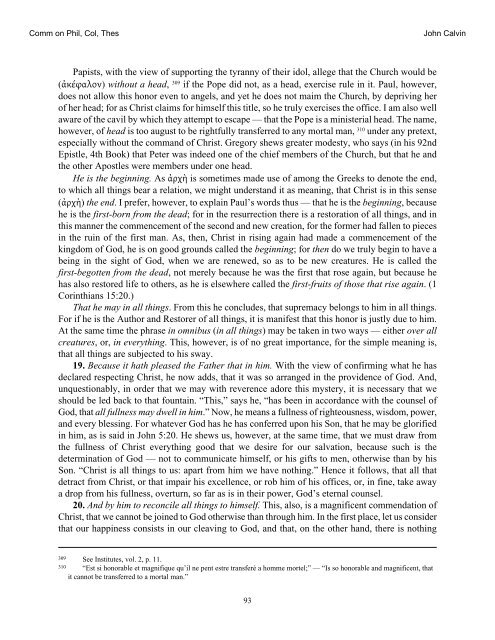Commentary on Philippians, Colossians, and Thessalonians
Commentary on Philippians, Colossians, and Thessalonians
Commentary on Philippians, Colossians, and Thessalonians
Create successful ePaper yourself
Turn your PDF publications into a flip-book with our unique Google optimized e-Paper software.
Comm <strong>on</strong> Phil, Col, Thes<br />
Papists, with the view of supporting the tyranny of their idol, allege that the Church would be<br />
(ἀκέφαλον) without a head, 309 if the Pope did not, as a head, exercise rule in it. Paul, however,<br />
does not allow this h<strong>on</strong>or even to angels, <strong>and</strong> yet he does not maim the Church, by depriving her<br />
of her head; for as Christ claims for himself this title, so he truly exercises the office. I am also well<br />
aware of the cavil by which they attempt to escape — that the Pope is a ministerial head. The name,<br />
however, of head is too august to be rightfully transferred to any mortal man, 310 under any pretext,<br />
especially without the comm<strong>and</strong> of Christ. Gregory shews greater modesty, who says (in his 92nd<br />
Epistle, 4th Book) that Peter was indeed <strong>on</strong>e of the chief members of the Church, but that he <strong>and</strong><br />
the other Apostles were members under <strong>on</strong>e head.<br />
He is the beginning. As ἀρχὴ is sometimes made use of am<strong>on</strong>g the Greeks to denote the end,<br />
to which all things bear a relati<strong>on</strong>, we might underst<strong>and</strong> it as meaning, that Christ is in this sense<br />
(ἀρχὴ) the end. I prefer, however, to explain Paul’s words thus — that he is the beginning, because<br />
he is the first-born from the dead; for in the resurrecti<strong>on</strong> there is a restorati<strong>on</strong> of all things, <strong>and</strong> in<br />
this manner the commencement of the sec<strong>on</strong>d <strong>and</strong> new creati<strong>on</strong>, for the former had fallen to pieces<br />
in the ruin of the first man. As, then, Christ in rising again had made a commencement of the<br />
kingdom of God, he is <strong>on</strong> good grounds called the beginning; for then do we truly begin to have a<br />
being in the sight of God, when we are renewed, so as to be new creatures. He is called the<br />
first-begotten from the dead, not merely because he was the first that rose again, but because he<br />
has also restored life to others, as he is elsewhere called the first-fruits of those that rise again. (1<br />
Corinthians 15:20.)<br />
That he may in all things. From this he c<strong>on</strong>cludes, that supremacy bel<strong>on</strong>gs to him in all things.<br />
For if he is the Author <strong>and</strong> Restorer of all things, it is manifest that this h<strong>on</strong>or is justly due to him.<br />
At the same time the phrase in omnibus (in all things) may be taken in two ways — either over all<br />
creatures, or, in everything. This, however, is of no great importance, for the simple meaning is,<br />
that all things are subjected to his sway.<br />
19. Because it hath pleased the Father that in him. With the view of c<strong>on</strong>firming what he has<br />
declared respecting Christ, he now adds, that it was so arranged in the providence of God. And,<br />
unquesti<strong>on</strong>ably, in order that we may with reverence adore this mystery, it is necessary that we<br />
should be led back to that fountain. “This,” says he, “has been in accordance with the counsel of<br />
God, that all fullness may dwell in him.” Now, he means a fullness of righteousness, wisdom, power,<br />
<strong>and</strong> every blessing. For whatever God has he has c<strong>on</strong>ferred up<strong>on</strong> his S<strong>on</strong>, that he may be glorified<br />
in him, as is said in John 5:20. He shews us, however, at the same time, that we must draw from<br />
the fullness of Christ everything good that we desire for our salvati<strong>on</strong>, because such is the<br />
determinati<strong>on</strong> of God — not to communicate himself, or his gifts to men, otherwise than by his<br />
S<strong>on</strong>. “Christ is all things to us: apart from him we have nothing.” Hence it follows, that all that<br />
detract from Christ, or that impair his excellence, or rob him of his offices, or, in fine, take away<br />
a drop from his fullness, overturn, so far as is in their power, God’s eternal counsel.<br />
20. And by him to rec<strong>on</strong>cile all things to himself. This, also, is a magnificent commendati<strong>on</strong> of<br />
Christ, that we cannot be joined to God otherwise than through him. In the first place, let us c<strong>on</strong>sider<br />
that our happiness c<strong>on</strong>sists in our cleaving to God, <strong>and</strong> that, <strong>on</strong> the other h<strong>and</strong>, there is nothing<br />
309 See Institutes, vol. 2, p. 11.<br />
310 “Est si h<strong>on</strong>orable et magnifique qu’il ne pent estre transferé a homme mortel;” — “Is so h<strong>on</strong>orable <strong>and</strong> magnificent, that<br />
it cannot be transferred to a mortal man.”<br />
93<br />
John Calvin















